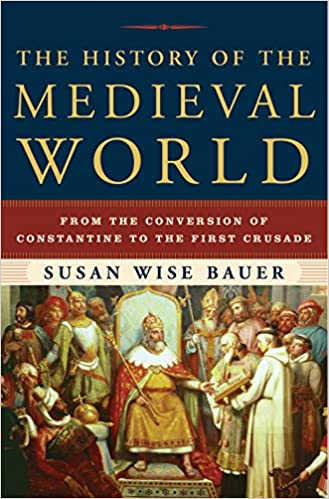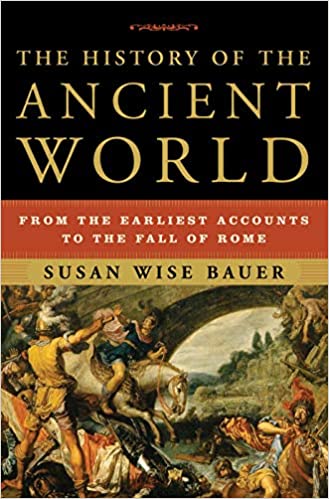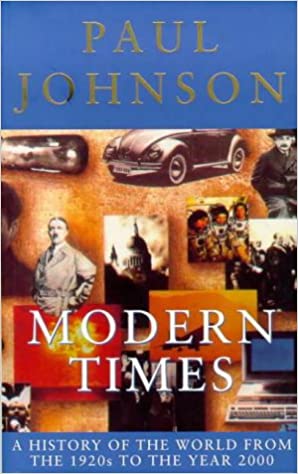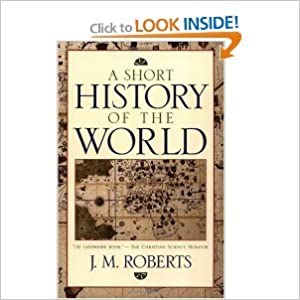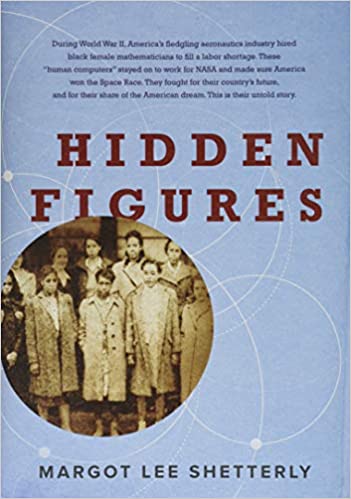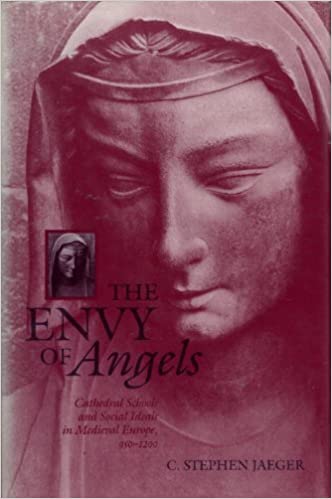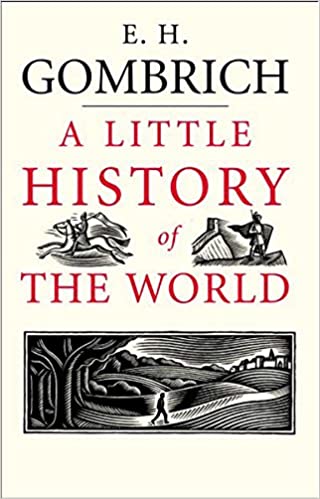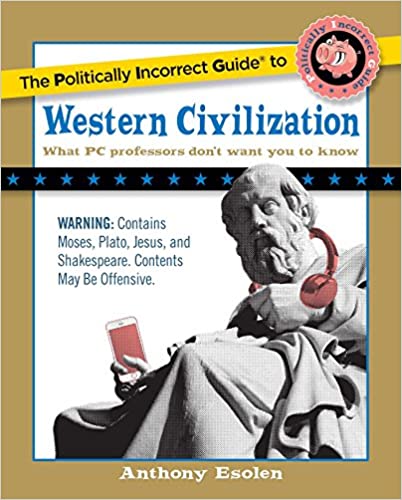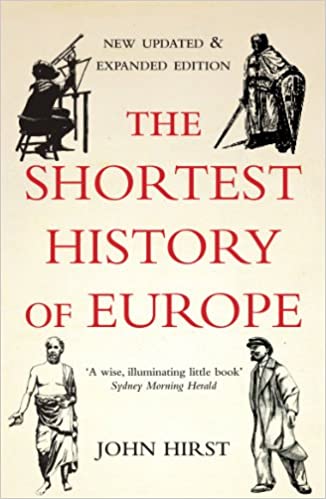History of the Peloponnesian War
From Amazon:
Thucydides called his account of two decades of war between Athens and Sparta “a possssion for all time,” and indeed it is the first and still most famous work in the Western historical tradition. Considered essential reading for generals, statesmen, and liberally educated citizens for more than 2,000 years, The Peloponnesian War is a mine of military, moral, political, and philosophical wisdom.
More info →The History of the Medieval World: From the Conversion of Constantine to the First Crusade
From Amazon:
"In her earlier work, The History of the Ancient World, Susan Wise Bauer wrote of the rise of kingship based on might. But in the years between the fourth and twelfth centuries, rulers had to find new justification for their power, and they turned to divine truth or grace to justify political and military action. Right began to replace might as the engine of empire.
Not just Christianity and Islam but also the religions of the Persians, the Germans, and the Mayas were pressed into the service of the state. Even Buddhism and Confucianism became tools for nation building. This phenomenon―stretching from the Americas all the way to Japan―changed religion, but it also changed the state.
The History of the Medieval World is a true world history, linking the great conflicts of Europe to the titanic struggles for power in India and Asia. In its pages, El Cid and Guanggaeto, Julian the Apostate and the Brilliant Emperor, Charles the Hammer and Krum the Bulgarian stand side by side. From the schism between Rome and Constantinople to the rise of the Song Dynasty, from the mission of Muhammad to the crowning of Charlemagne, from the sacred wars of India to the establishment of the Knights Templar, this erudite book tells the fascinating, often violent story of kings, generals, and the peoples they ruled."
More info →The History of the Ancient World: From the Earliest Accounts to the Fall of Rome
A lively and engaging narrative history showing the common threads in the cultures that gave birth to our own.
This is the first volume in a bold new series that tells the stories of all peoples, connecting historical events from Europe to the Middle East to the far coast of China, while still giving weight to the characteristics of each country. Susan Wise Bauer provides both sweeping scope and vivid attention to the individual lives that give flesh to abstract assertions about human history.
Dozens of maps provide a clear geography of great events, while timelines give the reader an ongoing sense of the passage of years and cultural interconnection. This old-fashioned narrative history employs the methods of “history from beneath”―literature, epic traditions, private letters and accounts―to connect kings and leaders with the lives of those they ruled. The result is an engrossing tapestry of human behavior from which we may draw conclusions about the direction of world events and the causes behind them.
13 illustrations, 80 maps
More info →Modern Times: A History of the World from the 1920s to the Year 2000
The classic world history of the events, ideas, and personalities of the twentieth century.
More info →A Short History of the World
Mentioned in:
- Episode #69 - Socratic Trialogue (with Renee Shepard!) during the Scholé Every Day segment
Hidden Figures: The American Dream and the Untold Story of the Black Women Mathematicians Who Helped Win the Space Race
The phenomenal true story of the black female mathematicians at NASA at the leading edge of the feminist and civil rights movement, whose calculations helped fuel some of America’s greatest achievements in space—a powerful, revelatory contribution that is as essential to our understanding of race, discrimination, and achievement in modern America as Between the World and Me and The Immortal Life of Henrietta Lacks. The basis for the smash Academy Award-nominated film starring Taraji P. Henson, Octavia Spencer, Janelle Monae, Kirsten Dunst, and Kevin Costner.
Before John Glenn orbited the earth, or Neil Armstrong walked on the moon, a group of dedicated female mathematicians known as “human computers” used pencils, slide rules and adding machines to calculate the numbers that would launch rockets, and astronauts, into space.
Among these problem-solvers were a group of exceptionally talented African American women, some of the brightest minds of their generation. Originally relegated to teaching math in the South’s segregated public schools, they were called into service during the labor shortages of World War II, when America’s aeronautics industry was in dire need of anyone who had the right stuff. Suddenly, these overlooked math whizzes had a shot at jobs worthy of their skills, and they answered Uncle Sam’s call, moving to Hampton, Virginia and the fascinating, high-energy world of the Langley Memorial Aeronautical Laboratory.
Even as Virginia’s Jim Crow laws required them to be segregated from their white counterparts, the women of Langley’s all-black “West Computing” group helped America achieve one of the things it desired most: a decisive victory over the Soviet Union in the Cold War, and complete domination of the heavens.
Starting in World War II and moving through to the Cold War, the Civil Rights Movement and the Space Race, Hidden Figures follows the interwoven accounts of Dorothy Vaughan, Mary Jackson, Katherine Johnson and Christine Darden, four African American women who participated in some of NASA’s greatest successes. It chronicles their careers over nearly three decades they faced challenges, forged alliances and used their intellect to change their own lives, and their country’s future.
More info →The Envy of Angels: Cathedral Schools and Social Ideals in Medieval Europe, 950-1200
Before the rise of universities, cathedral schools educated students in a course of studies aimed at perfecting their physical presence, their manners, and their eloquence. The formula of cathedral schools was "letters and manners" (litterae et mores), which asserts a pedagogic program as broad as the modern "letters and science." The main instrument of what C. Stephen Jaeger calls "charismatic pedagogy" was the master's personality, his physical presence radiating a transforming force to his students. In The Envy of Angels, Jaeger explores this intriguing chapter in the history of ideas and higher learning and opens a new view of intellectual and social life in eleventh- and early twelfth-century Europe.
More info →A Little History of the World
“All stories begin with ‘Once upon a time.’ And that’s just what this story is all about: what happened, once upon a time.” So begins A Little History of the World, an engaging and lively book written for readers both young and old. Rather than focusing on dry facts and dates, E. H. Gombrich vividly brings the full span of human experience on Earth to life, from the stone age to the atomic age. He paints a colorful picture of wars and conquests; of grand works of art; of the advances and limitations of science; of remarkable people and remarkable events, from Confucius to Catherine the Great to Winston Churchill, and from the invention of art to the destruction of the Berlin Wall.
For adults seeking a single-volume overview of world history, for students in search of a quick refresher course, or for families to read and learn from together, Gombrich’s Little History enchants and educates.
More info →The Politically Incorrect Guide to Western Civilization
Everything you should know--but PC professors won't teach--about Western heritage.
Western civilization is the envy of the globe. It has given to the world universally accepted understandings of human rights (rooted in Judeo-Christian principles), created standards for art, music, and literature that have never been equaled, and originated political and social systems that have spread all across the planet.
Political correctness now obscures these and other truths about Western civilization. Leftists and Islamic jihadists find common cause in assailing Western "colonialism," "imperialism," and "racism" as its defining characteristics. Guilt-ridden Western leaders and public figures speak of their cultural patrimony in disparaging terms they would never dare to use about a non-Western culture. And in universities, "multicultural"-minded professors flatter students into believing they have nothing really to learn from Sophocles or Shakespeare.
More info →The Shortest History of Europe
In this short, entertaining and thought-provoking book, acclaimed historian John Hirst provides a fascinating exploration of the qualities that have made Europe a world-changing civilisation. Starting with a rapid historical overview from the ancient Greeks to the present day (the 'shortest history' itself), Hirst goes on to explore in detail what makes Europe unique: its political evolution; the shaping influence of its linguistic boundaries; the crucial role played by power struggles between Pope and Emperor; and of course the great invasions and conquests that have transformed the continent.
More info →



